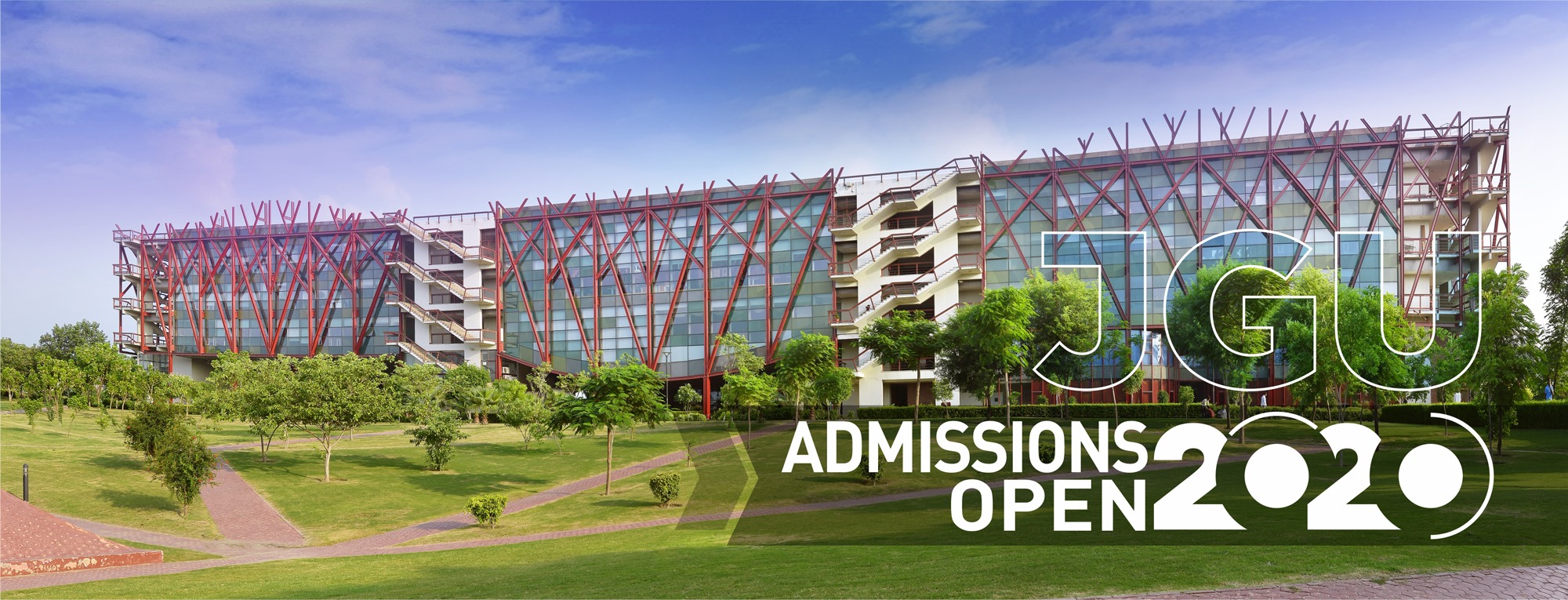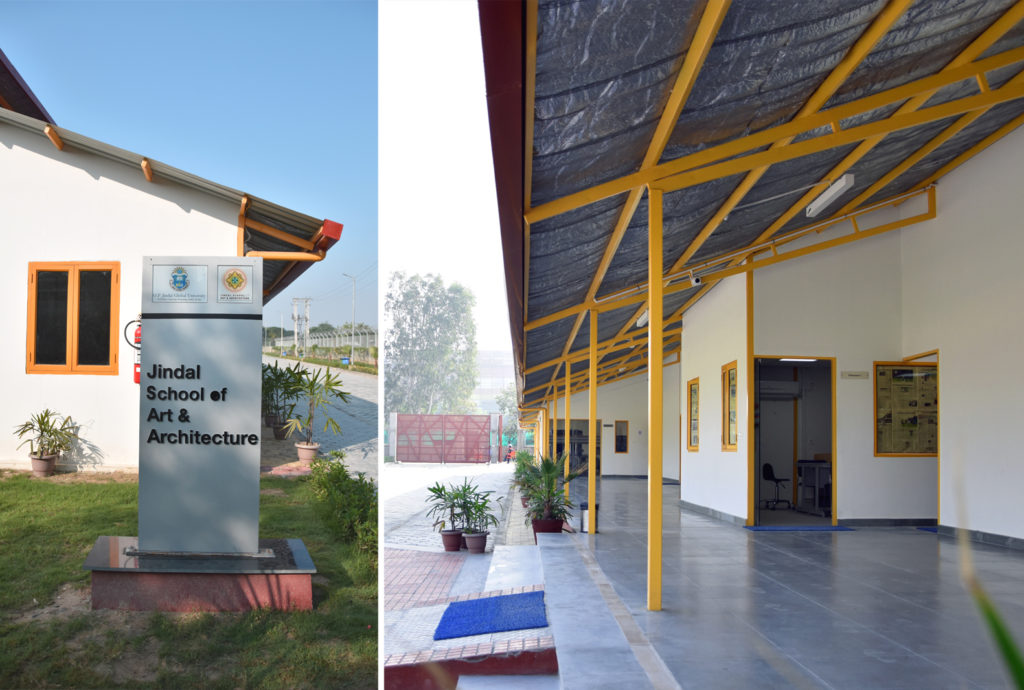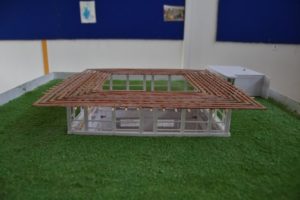Jindal School of Art & Architecture
 The Jindal School of Art and Architecture is founded with the vision to become one of the foremost schools of learning of the visual, material and the built environments. The School is committed to developing an academic environment that is intellectually rigorous, interdisciplinary, innovative, and creative. The school follows internationally accepted best practices of the academia and is supported by an acclaimed faculty. We believe in research and innovative excellence that fosters interdisciplinary research cutting across academic programs allowing students and faculty to actively engage in addressing the most pressing issues facing our world today.
The Jindal School of Art and Architecture is founded with the vision to become one of the foremost schools of learning of the visual, material and the built environments. The School is committed to developing an academic environment that is intellectually rigorous, interdisciplinary, innovative, and creative. The school follows internationally accepted best practices of the academia and is supported by an acclaimed faculty. We believe in research and innovative excellence that fosters interdisciplinary research cutting across academic programs allowing students and faculty to actively engage in addressing the most pressing issues facing our world today.
Hands on Approach: At JSAA, learning happens through experiencing spaces and forms through materiality, walking through streets, conversing with multiple stakeholders, observing and using varied forms of documentation.
Global Faculty: The faculty team comprises of urbanists, architects, historians, anthropologists, artists, lawyers and engineers who have studied and taught in various reputed universities all around the world.
Multi-Disciplinary Curriculum: Students will be encouraged to work across different disciplines enabling them to think critically, create and make using varied tools and mediums, read extensively across disciplines and set new frameworks of research and practice.
Bachelor of Architecture (B. Arch.)
 The Bachelors of Architecture Program at the Jindal School of Art and Architecture (JSAA) is a five-year program in architecture which prepares you for a career as a licensed architect in India. The unique program at JSAA is divided into two parts; the Major and the Minor. In the Major you learn about material and making, about design thinking. You explore the social, historical, political, economic and technological interfaces of architecture. The major allows you to participate in exchange studios and collaborative works with students from some of the best schools in architecture such as AAP (Cornell), DAAP (University of Cincinnati), Bartlett (University College of London). The program places you in multiple internships at leading firms where you gain work experience, learn from and interact with the best architects in India and the world.
The Bachelors of Architecture Program at the Jindal School of Art and Architecture (JSAA) is a five-year program in architecture which prepares you for a career as a licensed architect in India. The unique program at JSAA is divided into two parts; the Major and the Minor. In the Major you learn about material and making, about design thinking. You explore the social, historical, political, economic and technological interfaces of architecture. The major allows you to participate in exchange studios and collaborative works with students from some of the best schools in architecture such as AAP (Cornell), DAAP (University of Cincinnati), Bartlett (University College of London). The program places you in multiple internships at leading firms where you gain work experience, learn from and interact with the best architects in India and the world.
In addition to the Major, the program at the JSAA also allows you to choose one minor area of study. The minor areas of study are carefully designed to provide you with additional skillsets which no other program of architecture in the country provides. As a result, you emerge as an architect with a unique combination of abilities which can be applied across multiple industries and sectors.
Eligibility
A prospective student should have successfully passed the examination conducted by a Board/University at the +2 level of schooling with 50% marks in Physics, Chemistry & Mathematics & also 50 % marks in aggregate (either through formal schooling for 12 years, or through open school system) & 50% NATA score or 50% JEE-2 score.
Fee
Tuition Fee: Rs. 4 Lakhs per annum and Hostel & Dining charges: Rs. 2.4 Lakhs per annum
 Bachelor of Design (B.Des)- Interior Design
Bachelor of Design (B.Des)- Interior Design
The Bachelor of Design is a professional degree program for students who wish to work towards improving the inhabited spaces through experimental, experiential, and informed design processes. The program teaches students to imagine, propose, test and refine their ideas about how to live and dwell in the contemporary world and trains students in the knowledge systems that help anticipate changes in the future built environments (from domestic to urban scale). The program uniquely places student-centred inquiry as the core learning, through a sequential studio sequence culminating in a customized capstone design project. These courses are taught by internationally-trained design professors. The professional practice courses include new forms of social and technical knowledge: diversity, sustainability, digital representations and professional ethics. Other features of the program comprise diverse, customizable electives, a flexible system of minors in multiple subjects taught across schools within the university. This is a program for students with ambition, imagination and curiosity who wish to imagine and lead the design of a better world, and wishes to become knowledgeable and influential future design professions.
At present, the B.Des. Program offers following pathways after a common foundation year.
Interior Pathway:
A fundamental aspect of being is incumbent upon inhabiting, itself a continuous and fluid practice. To inhabit means to leave traces – individually or as a collective – through objects, materials, memories and practices, within and without our spaces of living, working and playing, all of which intimately intersect with issues of identity, class, caste, gender, communities, ecologies, social justice, technologies, legalities, and economics, to name a few. How do you, as a future design professional, embed yourself within such a multiplicity of narratives, and craft a new narrative?
traces – individually or as a collective – through objects, materials, memories and practices, within and without our spaces of living, working and playing, all of which intimately intersect with issues of identity, class, caste, gender, communities, ecologies, social justice, technologies, legalities, and economics, to name a few. How do you, as a future design professional, embed yourself within such a multiplicity of narratives, and craft a new narrative?
The 4 year (Foundation + 3) Interior Design pathway at the Jindal School of Art and Architecture situates itself within this terrain to train and develop you into an industry-ready professional who is critical, and entrepreneurial; who is globally competitive but locally embedded; who is invested in making and able to think on your feet; who exercises empathy and practices judiciously across diverse scales and media. The built-environment, which undergoes constant adaptive re-use, becomes your laboratory.
Though rigorous, this interdisciplinary programme is unique for several reasons. For one, we follow a learner-centric philosophy, and thus, the programme is designed around your interests, allowing you simultaneous lateral and vertical progression. Next, it is the only design programme in the country which has a major and a minor component. The major forms your focus and primary area of study, whereas the minor allows you to strengthen your interests and skills. Lastly, work experience is not only built into the programme, it forms our very bedrock. This is achieved, apart from mandatory internships, by bringing live projects and clients into the studio, thus ensuring seamless integration into your chosen industry upon graduating.
Master classes, workshops and invited talks from a variety of practices further inform the course of study.
The Interior Design Pathway allows you to apply current practices of the industry through, though not limited to, the following:
- Spatial Design

- Building Services
- Mapping Interior/ Exterior Environments and Landscapes
- Body and Perception
- Materials and Styles
- Color and Texture
- Objects, Equipment and Affordances
- Lighting
- Social Design and Collaborative Working
- Gender and Space
- Ecologies and Sustainable Practices
- Field Notes and Ethnographies
- Indigenous Craft Practices
- Specifications and Codes
- Ethics and Professional Practices
After Graduation:
Employment: Interior Architect, Independent Researcher, Design Educator, Scenographer, Furniture Designer, Lighting Designer, Product Designer, Marketing and Sales, Hospitality consultant, Sustainable interiors consultant, Landscape Designer, Building Pathologist, Systems Designer, Media Visualizer, Curatorial Consultant, Community Designer, User Experience Designer, Communication Designer, Interior Journalist, Illustrator, Photographer, Project Manager, amongst others.
Post-Graduate Studies: Graduating students of the program can apply to a variety of post-graduate programmes, both nationally and internationally, in and not limited to Interior Design Studies, Architectural Studies, Lighting Design studies, Design and Technology Studies, Textiles Design, Product Design, Production Design, Industrial Design, Transdisciplinary design studies, Urban Ecologies Studies, Project Management, Business Studies, Liberal Arts, Legal Studies, Government and Political Studies, Community Planning, Environment and Sustainability Studies, Journalism and Communication, Economics and Policy Studies amongst others.
Eligibility & Admission Criteria:
Min. Eligibility: 10+2 or Equivalent with a minimum of 60% marks (CBSE, ISC, State Boards, IB, Cambridge, and other Government Recognized Boards) and NIFT/NID/NATA/UCEED/JEE-2/CEPT score
For Admission into B.Des. program: Applicants are selected through a holistic admissions process conducted over three rounds based on a personal statement, supplemental application, X and XII Grade Marks, Faculty Interview. etc. The following minimum scores are required to receive an invitation for Personal Interview & Portfolio Review.
Results required- JSAT-50 %/SAT-1100 & above/JEE-2-165 Marks & Above/NATA- 80 Marks & Above /NIFT- Qualified/NID-Qualified/UCEED PART A (Total)- 50 and above.
Fee: Tuition Fee- Rs. 3.0 Lakh per year & Hostel Fee– Rs. 2.4 Lakh per year
CONTACT INFO
Jindal School of Art and Architecture (JSAA) , O.P. Jindal Global University (JGU) Sonipat Narela Road, Near Jagdishpur Village, Sonipat, Haryana – 131001, NCR of Delhi, India
+91 8930302097
- azad@jgu.edu.in.
- click to apply- https://bit.ly/2LjhJR2















